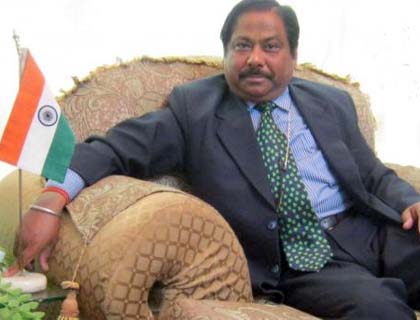HERAT CITY - A major dam project, which is estimated to cost more than $180 million, (Afs 8.191 billion) Afghanis will be completed in the Chasht Sharif district of western Herat province by end of 2012, the Indian consul general promised on Sunday.
Once completed, the hydroelectric plant will produce 42 megawatts of power in addition to irrigating 40,000 hectares of farmland. Located on the Hari Rod River, 162 kilometers from Herat City, Salma dam was built in 1976. However, it was extensively damaged during the civil war.
In an exclusive interview with Pajhwok Afghan News, Tara Chand characterized the dam's reconstruction as a question of credibility for New Delhi. They would never back out of the mega project, which was left incomplete by the Indian company WAPCOS Ltd.
He assuaged concerns among Afghan leaders that India could abandon the plan due to alleged Iranian efforts at sabotaging the dam, which would reduce the flow of Hari Rod River water into the neighboring country.
"We had considered all possible challenges before initiating work on the dam. We remain determined to execute the scheme at all costs," reiterated the diplomat, who acknowledged that the freezing cold and snow, as well as insecurity, over the last four months had led to a delay.
Armed clashes and insurgent activity in areas around the dam had affected workers' morale, Tara Chand admitted. He was referring to frequent bloody gunbattles between supporters of two rival warlords in Chasht Sharif.
"At times, the warring sides can be seen from the middle of the camp. But thank God, the project and workers on it remain unharmed," he said, when asked whether the clashes posed a direct threat to them. However, the violence threatened to impede smooth work on the dam.
"We did receive reports that Iran is fuelling insecurity in the area to hinder the plan. However, we have no documentary evidence in support of this speculation," the envoy explained.
With a width of 550 meters and height of 107 meters, the dam will have a storage capacity of 514 MAF, according to Herat's Director of Water and Energy Department.
Tehran built the Iran-Turkmenistan Friendship Dam near the Afghanistan border in 2005 without reaching an agreement with Kabul. Both countries agreed to have an equal right to the waters of Hari Rod River, which amount to 820 million cubic metres, meeting irrigates needs of several Iranian cities.
During the President Daud Khan era, the Indian government promised in 1978 to launch work on rehabilitating the dam, but the subsequent coup and civil war scuttled the plan.
But work on the dam resumed in 2006 and was scheduled to be completed in four years. However, it is yet to be completed. Five years back, the cost was estimated at $85 million. But Indian officials say the cost has jumped to $180 million.
The consul general identified flawed security assessments, harsh climatic conditions and administrative weaknesses of construction companies as the main causes of the delay. "Rains and floods washed away parts of the dam constructed in the first year."
The huge distance between Herat City and the site, as well as the absence of a proper road network, also contributed to the delay, Tara Chand continued.
Currently, four Indian companies with 700 employees -- about 200 of them Indians –are working on the project. Under an agreement with the Afghan government, the import of building materials and equipment for the dam was exempted from taxes and duties, he explained.
However, the consul general complained, the Indian companies were facing problems due to delays in clearance of the required materials at the Herat Customs Department. The contractors were forced to pay for early deliveries, he added.
In addition to the customs-related irritants, a local official confided to Pajhwok, the government had also created other problems for the Indian firms in violation of the commitments held out to them.
In recent years, the source claimed, the Ministry of Interior in Kabul had received "tens of thousands of dollars" from the Indian government to provide security for the project. He went on to blame security guards for seeking fuel from the executing firms.
The diplomat also verified payments to the Ministry of Interior. "The ministry gets about $700,000 from the Indian government annually to provide security for the dam." He also confirmed the project security commander was given 60 to 70 liters of fuel on a daily basis.
However, the consul general praised local authorities, particularly Afghan National Army soldiers, for cooperating with the Indian firms in implementing the project, which is scheduled to be completed by end of 2012.

